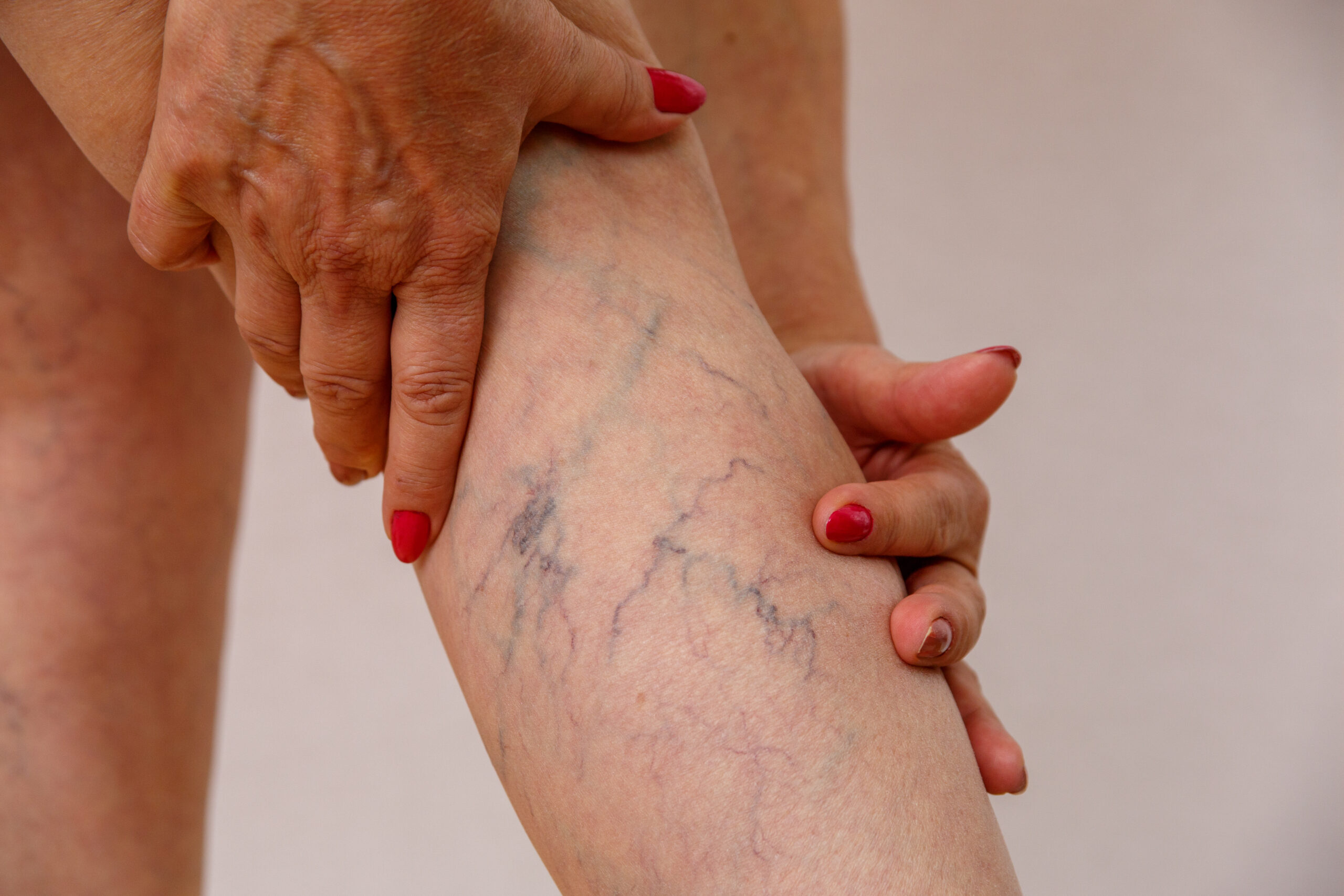Varicose Veins
Home
Varicose Veins
Holistic Ayurvedic Care for Varicose Veins: Symptoms & Remedies
Varicose veins are enlarged, twisted veins, usually appearing in the legs due to poor circulation, weak vein walls, or prolonged standing. They can cause heaviness, pain, swelling, and discomfort, affecting daily life and mobility.
While modern treatments often involve surgery or compression therapy, Holistic Ayurvedic Care for Varicose Veins: Symptoms & Remedies offers a natural, non-invasive, and holistic approach. Ayurveda focuses on strengthening vein walls, improving blood circulation, reducing inflammation, and detoxifying the body to provide long-term relief.
Causes of Varicose Veins: Ayurvedic Perspective
In Ayurveda, varicose veins are primarily caused by Vata dosha imbalance. Poor circulation, toxin accumulation (Ama), and sedentary lifestyle aggravate the condition. Weak vein walls and improper diet also contribute.
Common Causes
- Prolonged sitting or standing
- Obesity and excess weight
- Aging and genetic predisposition
- Hormonal changes in women (pregnancy or menopause)
- Sedentary lifestyle
- Poor dietary habits: fried, oily, or processed foods
The Holistic Ayurvedic Care for Varicose Veins: Symptoms & Remedies focuses on treating these root causes naturally for long-term vein health.

Symptoms of Varicose Veins
Early recognition helps in effective Ayurvedic management.
Key Symptoms
- Bulging, twisted veins in legs
- Heaviness, fatigue, or cramps in legs
- Swelling in ankles or calves
- Burning, tingling, or itching sensations
- Skin discoloration or ulcer formation in severe cases
The Holistic Ayurvedic Care for Varicose Veins: Symptoms & Remedies alleviates these symptoms and strengthens veins naturally.
Ayurvedic Remedies for Varicose Veins
Ayurvedic remedies combine herbs, therapies, and lifestyle modifications to manage varicose veins effectively.
Herbal Remedies
- Gotu Kola (Centella asiatica): Strengthens vein walls, improves circulation
- Guggul: Reduces inflammation and supports vascular health
- Arjuna (Terminalia arjuna): Enhances vein elasticity and heart health
- Triphala: Detoxifies blood and balances metabolism
- Horse Chestnut (Aesculus hippocastanum): Reduces swelling and leg heaviness
Ayurvedic Therapies
- Abhyanga (Herbal Oil Massage): Stimulates blood flow and relieves leg fatigue
- Swedana (Herbal Steam Therapy): Detoxifies tissues, reduces swelling
- Panchakarma: Eliminates toxins, balances doshas, and prevents recurrence
Diet & Lifestyle Tips
- Eat fiber-rich foods, fresh fruits, and vegetables
- Avoid fried, processed, and salty foods
- Drink warm water and herbal teas
- Regular walking, yoga, and leg exercises
- Elevate legs while resting, avoid prolonged sitting or standing
Home Remedies for Varicose Veins
- Warm herbal compress: Improves circulation and reduces discomfort
- Leg elevation: Lie down and raise legs above heart level for 15–20 minutes daily
- Turmeric paste: Anti-inflammatory properties reduce swelling and pain
- Coconut oil massage: Light daily massage with warm oil improves vein health
These remedies support the holistic approach of Holistic Ayurvedic Care for Varicose Veins: Symptoms & Remedies and accelerate recovery.
Exercises to Improve Varicose Veins
- Leg lifts: Strengthens calf muscles and improves blood flow
- Ankle rotations: Stimulates circulation in lower limbs
- Walking or brisk walking: Enhances vein strength and reduces swelling
- Yoga asanas: Like Viparita Karani (legs up the wall) help in reducing vein pressure
Combining herbal remedies, therapies, exercises, and diet maximizes the effectiveness of Holistic Ayurvedic Care for Varicose Veins: Symptoms & Remedies.
Benefits of Holistic Ayurvedic Care for Varicose Veins
- Reduces pain, swelling, and leg heaviness naturally
- Strengthens vein walls and prevents new varicose veins
- Improves blood circulation and overall leg health
- Detoxifies the body and balances doshas naturally
- Non-invasive, safe, and suitable for all ages
- Supports long-term wellness without side effects
FAQ
It is a natural healing approach that uses herbal remedies, Panchakarma therapies, dietary changes, and yoga-based exercises to improve vein health. It focuses on strengthening blood vessels, improving circulation, and detoxifying the body to reduce pain, swelling, and recurrence.
According to Ayurveda, varicose veins are due to a Vata dosha imbalance, leading to poor blood circulation, weak vein walls, and accumulation of toxins (Ama). Lifestyle factors like prolonged standing or unhealthy eating worsen the condition.
- Bulging, twisted veins (usually in the legs)
- Heaviness, fatigue, or aching in the legs
- Swelling in the feet, ankles, or calves
- Burning, itching, or tingling sensations
- Skin discoloration or ulcers in advanced cases
Ayurveda addresses these symptoms without surgery, offering lasting relief.
- Gotu Kola – improves vein elasticity and circulation
- Guggul – anti-inflammatory and detoxifying
- Arjuna – supports cardiovascular and vascular health
- Triphala – cleanses toxins and boosts digestion
- Horse Chestnut – reduces swelling and heaviness
- Abhyanga (Herbal oil massage): Enhances blood flow and reduces stiffness
- Swedana (Steam therapy): Relieves congestion and detoxifies the body
- Panchakarma: Deep cleansing therapies that balance doshas and prevent recurrence
Yes. Ayurvedic treatment is non-invasive and focuses on managing the condition holistically by strengthening the veins, improving circulation, and correcting lifestyle habits. In early and moderate stages, many patients avoid surgery altogether.
You may start to see improvement in 4–6 weeks, such as reduced swelling and leg heaviness. For sustained vein health, a treatment plan of 2–3 months with herbs, therapies, and lifestyle corrections is usually recommended.
Yes. When administered under qualified Ayurvedic guidance, the treatment is natural, safe, and free from side effects. It is suitable for all age groups, including the elderly and those with chronic venous insufficiency.
- Elevate legs while resting to reduce pressure
- Avoid prolonged sitting or standing
- Practice leg movements and yoga
- Eat high-fiber, low-salt meals
- Stay hydrated and avoid fried or processed foods
Absolutely. Ayurveda helps strengthen veins, detoxify the blood, and maintain healthy digestion and circulation, which reduces the risk of worsening or recurrence. Regular Panchakarma, exercise, and a proper diet play a key role in long-term vein health
